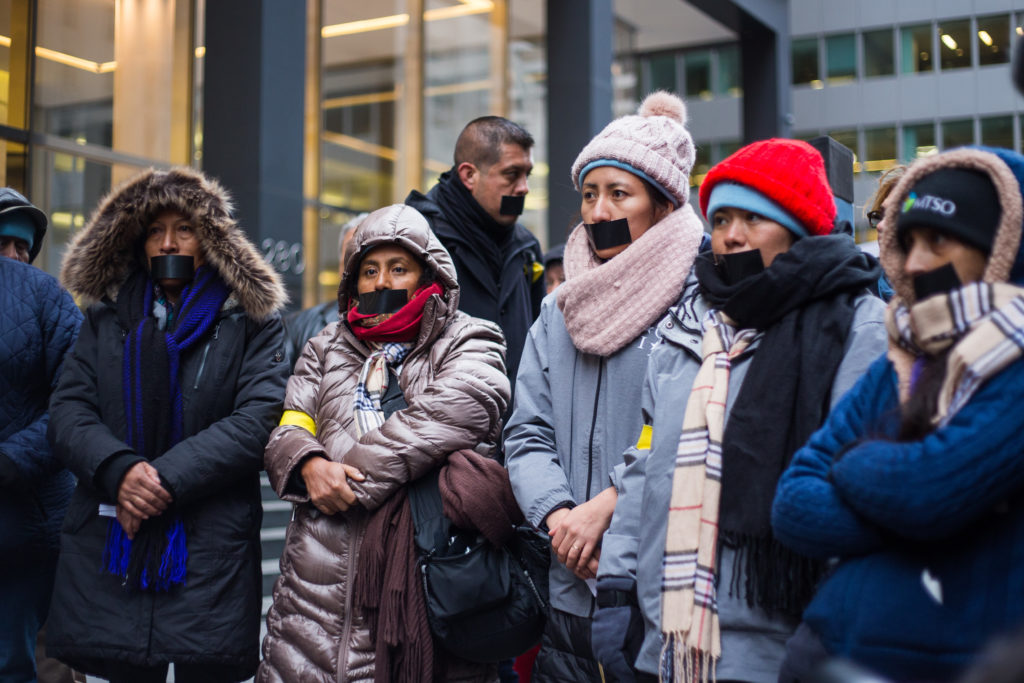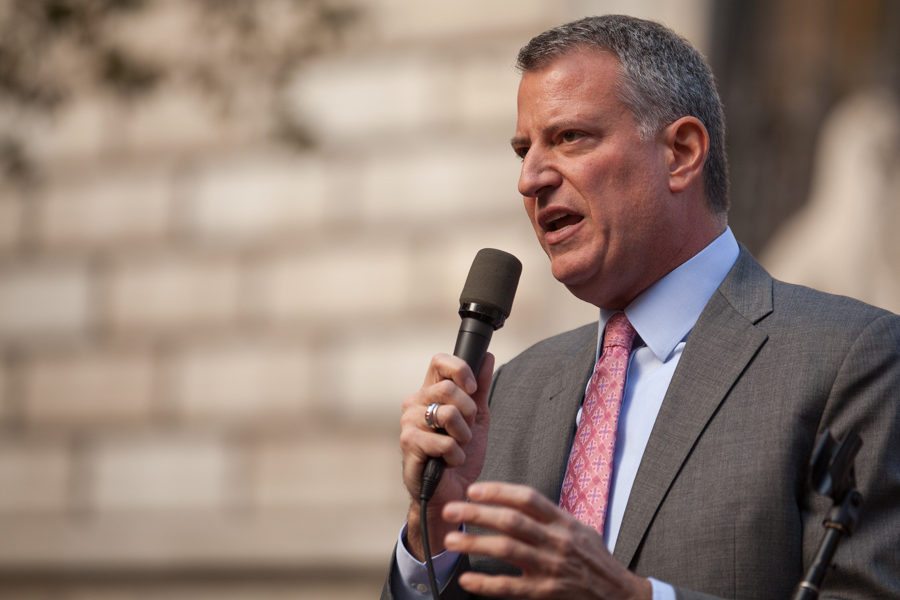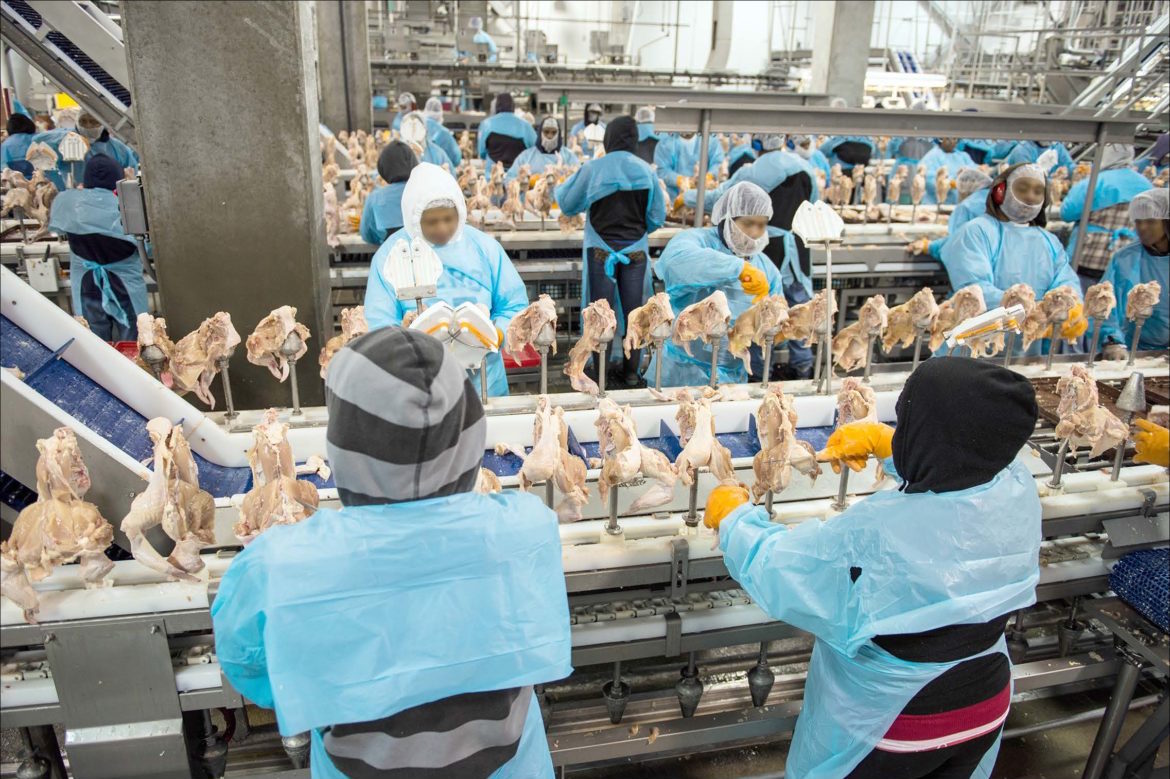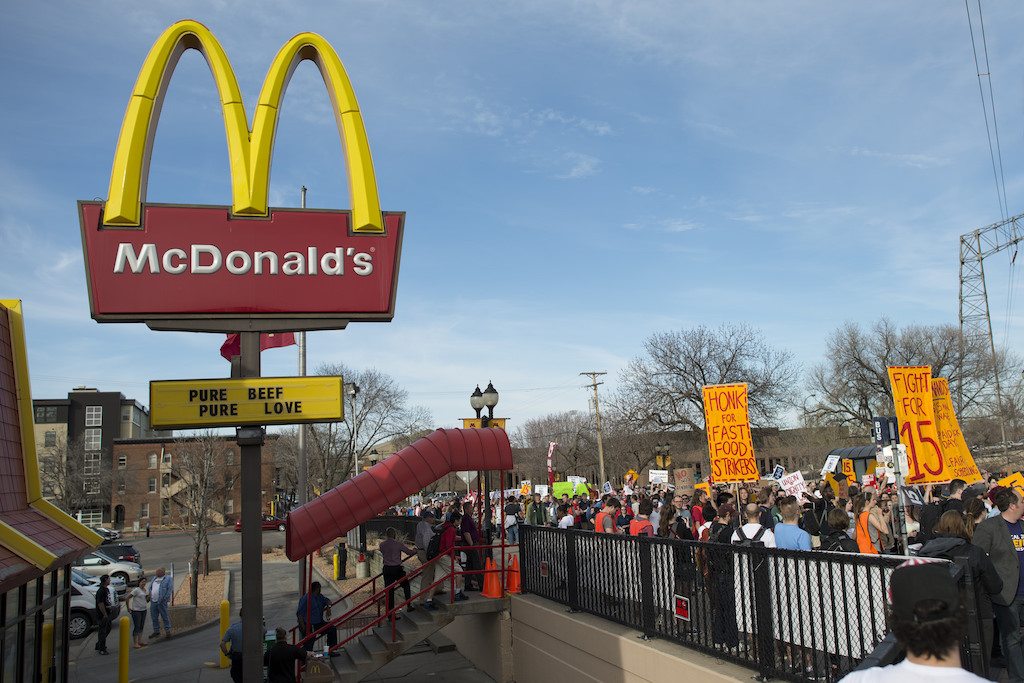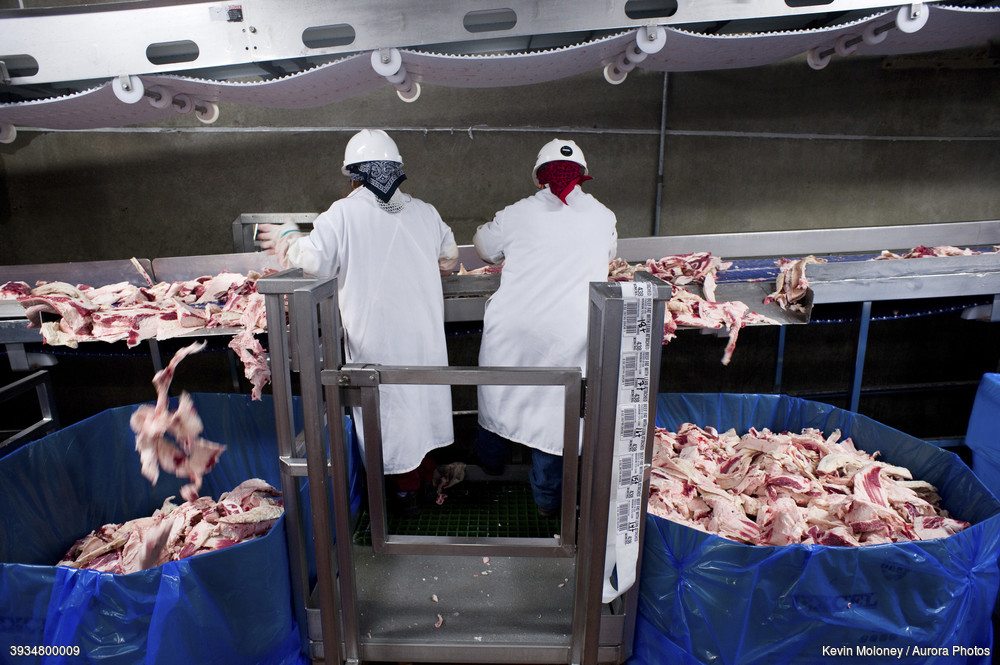
Kevin Moloney / Aurora Photos
Update, September 14, 2018, 12:40 p.m.: Cargill has agreed to pay $1.5 million, and Teamsters Local Union No. 455 has agreed to pay $153,000, to claimants in this case, the U.S. Equal Employment Opportunity Commission (EEOC) has announced. The settlements do not include admissions of wrongdoing.
The meatpacking industry has never been celebrated for its excellent working conditions. Slaughterhouse workers develop repetitive motion injuries at a rate nearly seven times the national average, according to NPR. Pay is typically pretty low. The Bureau of Labor Statistics estimates slaughterers and meatpackers make an average of $13 an hour, or about $27,000 a year. And a 2005 report by the advocacy organization Human Rights Watch suggested that meatpacking companies have actively tried to suppress labor unions, calling working in a slaughterhouse “the most dangerous factory job in America.”
This happens to be a particularly fraught moment in time for the industry. A month before the 2016 presidential election, the FBI arrested three men in Garden City, Kansas, who were allegedly plotting to bomb an apartment building that primarily housed refugees who worked in the local meatpacking plant. The FBI found that the planned bombings were driven by anti-Muslim sentiment. Yet at the same time that alt-right fury continues to grow louder and more public in parts of the United States, the meatpacking industry is increasingly reliant on refugee labor.
After then-President George W. Bush in 2006 ordered immigration raids on meatpacking plants in six states, the Los Angeles Times reported that recent immigrants from countries in the Middle East swept in to replace the undocumented workers who had been arrested or quit. Today, refugees are a vital part of the meatpacking industry’s labor force. So vital, in fact, that when President Trump signed the ban on immigration from six Muslim-majority nations, the industry trade group, North American Meat Institute, spoke out against it, saying the lobby group hoped Mr. Trump would consider the ban’s effect on the labor force.
In contrast, the Cargill plant in Fort Morgan, Colorado was a pretty good place to work, at least on paper. Pay started at $14 an hour. Employees could join the local Teamsters union. And until 2015, the company’s permissive attitude toward prayer in the workplace was a major selling point for Muslim applicants. Cargill even went so far as to set up designated “reflection rooms” for prayer in 2009. “If I can pray, I will do whatever they need,” former employee Abdukadir Ali told the New York Times in March.
But one day, that changed.
According to a discrimination complaint filed with the Colorado Civil Rights Division, late in the day on December 15, 2015, an employee asked to step out for her usual evening prayer break. Her supervisor told her he’d been informed that prayers were no longer allowed during work.
Over the next three days, she continued to ask for breaks to pray. On each of the three days, she was denied. Finally, on December 18, she and a group of nine other employees walked off the job. Ultimately, more than 150 workers left Cargill over what they perceived to be a “prayer ban.” When they didn’t return, they were fired.
All of the 150 employees were union members. All of them were Muslim, many of them black and Somali. And labor unions, at least hypothetically, exist to prevent exactly the type of discrimination the workers alleged. The whole point of collective bargaining is strength in numbers: If management suddenly changed the break policy for the entire plant, it almost certainly would’ve drawn the ire of the union, and executives would have had to contend with a potential loss in productivity. So why would a 150-person walkout not shut down an entire plant? In this case, the relationship between these Somali Muslim union members and Teamsters Local 455 had been breaking down for months—and by that day in December, it had almost completely disintegrated.
According to the complaint, tension had started to build during the summer of 2015, when many of the Somali Muslim workers requested a refund of their union fees, which totaled $35 per month. They claimed the union had failed to represent them and discriminated against them on the basis of race (they are black), religion (they are Muslim), and nationality (they are Somali). They also alleged that they had repeatedly asked that one of their community members be promoted to a union representative position, and that their requests had been ignored.
But by November of 2015, relations between the workers and the union had broken down even further. At least one worker claimed that he had been harassed by union members who hoped he would take back the refund request. It was then, claimed the worker, that a union member also told him his interests would no longer be represented.
“The facts seem pretty serious, about threats and preventing them from getting promoted and interrogating them about why they don’t want to pay the dues,” says Kabrina Chang, clinical associate professor of business law and ethics at Boston University. “Those are sort of textbook examples of what not to do.”
So on that day in December, when supervisors suddenly said prayer breaks were a no-go, the workers couldn’t ask their union representatives for help.
Here’s the trouble: The breaks had never been a problem in the past. They typically lasted only five or ten minutes, and employees were used to covering for each other on the line while their co-workers slipped out. They had always worked with their supervisors to stagger their breaks so that not too many people were missing at a time.
But on the day the “prayer ban” took effect, supervisors weren’t even allowing staggered breaks. One allegedly told an employee that she could take a 15-minute bathroom break but not a 15-minute prayer break. “There were Cargill supervisors who were actually blocking the doors to these prayer rooms that had been set up in the past,” says Laura Wolf, an attorney on the team representing the workers in their complaint.
Still, Cargill maintains it was all a misunderstanding. In December 2015, in a series of replies to public questions about the worker allegations, the company tweeted: “We didn’t change our prayer policy and our Muslim workers are still taking prayer breaks.” And on December 31, 2015, another tweeted statement: “We turned to the mosque, the elders, the Teamsters to get them to return. Unfortunately we lost good workers.” Cargill did not reply to a request for further comment.
In total, 130 of the fired workers filed complaints with the Equal Employment Opportunity Commission (EEOC), the federal agency that enforces the Civil Rights Act. It was a long shot—a favorable finding from the EEOC is exceedingly rare—but the workers had ample testimony collected during unemployment hearings to support their complaints.
On August 3, 2017, the EEOC ruled in favor of all 130 employees who filed complaints against Cargill, and 20 employees who filed complaints against the Teamsters.
For the attorneys representing the fired workers and supervisors, the ruling is a huge victory. The EEOC finds cause in less than three percent of the cases it looks at, and it almost never faults labor unions. “These were actually, I think, almost beyond even the decisions we could’ve ever hoped for or expected,” says Wolf.
In letters from EEOC district director Elizabeth Cadle excerpted in the Denver Post, the Commission said Cargill created a “hostile work environment based on their religion, race and national origin, including making disparaging racial, ethnic and religious comments and by requiring them to choose between their religion and work.”
The Teamsters, the letters said, dropped the ball “by historically failing to pursue grievances on their behalf relating to religious accommodation and by failing to intercede, advocate for or represent” the union’s own members. Teamsters Local 455 did not respond to requests for comment and as of the time this article was published, had not issued any public statements about the EEOC finding.
Next, the union and Cargill will have to decide whether or not to participate in a process called conciliation, where they meet with aggrieved employees behind closed doors. Many of the former Cargill employees have indicated they would like to go back to work if the conciliation process goes well. If Cargill and the Teamsters refuse to participate, the EEOC can issue “right to sue” letters, which would result in a federal lawsuit.
It seems unlikely that Cargill would dig its heels in on a so-called “prayer ban,” as it’s already denied the existence of such a thing in the first place.
What’s potentially more interesting is the future of the relationship between the Cargill employees and their union. A union doesn’t really work if it doesn’t represent everyone, and the EEOC findings don’t exactly make Teamsters 455 look like the embodiment of the inclusivity principles the labor movement was built on. “This, to me, seems like an important moment for the Teamsters,” Chang adds. “Certainly for the Teamsters in Colorado, they need to reassess and revisit what their purpose and goals are. “
The EEOC, meanwhile, is in the midst of another discrimination lawsuit on behalf of Somali Muslim workers in the Colorado meatpacking industry, one that’s been dragging on for almost a decade. In that case, workers allege that Brazil-based meatpacking company JBS refused to allow its employees during Ramadan to time their breaks so that they coordinated with sundown, when the fast is typically broken. According to Law360 (paywall), JBS is also accused of allowing a work environment where managers threw meat and bones at Somali Muslim employees. That trial was scheduled to begin on August 7.
The results of these two cases may have implications beyond the meat industry. A religious discrimination case against Abercrombie and Fitch made it all the way to the Supreme Court last year. Says Chang: “For better or for worse, this may be the beginning.”


